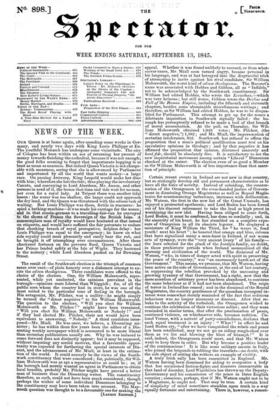The result of the Southwark election is the triumph of
common sense over cant—of plain honesty over a dishonest attempt to ex- cite the odium theologieunt. " Three candidates were offered to the choice of the electors. One, Sir William Molesworth, repre- sented, while yet unelected, the opinions prevalent in the borough—opinions more Liberal than Whiggish ; for, of all the public men whom the country had in store, be was one of the most suited to the particular tone of feeling in the borough. His antagonist, Mr. Pilcher, was a nullity—he might simply be termed the "direct negative" to Sir William Molesworth. The question to the electors, "Will you elect Sir William Molesworth or Mr. Pilcher ? " might have been translated, " Will you elect Sir William Molesworth or Nobody ? " and if they had elected Mr. Pilcher, their act would have been equivalent to answering, " Nobody." A third candidate inter- posed—Mr. Miall. He was once, we believe, a Dissenting mi- nister; he has within these few years been the editor of a Dis- senting weekly newspaper which is accounted to be more liberal than sectarian publications usually are. Why he was induced to come forward does not distinctly appear; but it may be supposed, without imputing any sordid motives, that a favourable oppor- tunity was expected for furthering the special interests of Dis- sent, and the advancement of Mr. Miall, at least in the estima- tion of the world. It could scarcely be the views of the South- wark constituency that were considered ; for, politically, Sir Wil- liam Molesworth was as apt a representative as could be ; or, if the borough had merely wanted an agent in Parliament to obtain local benefits, probably Mr. Pilcher might have proved a better man of business than the Dissenting writer. The constituency therefore, as such, could not have been much considered ; though perhaps the wishes of some individual Dissenters belonging to the constituency may have been taken into account. The May- nooth question was thought to be a favourable one for making the appeal. Whether it was found unlikely to succeed, or from what- soever cause, Mr. Miall soon turned angry, became personal in his language, and was at last betrayed into the disgraceful trick o- of attemptin to incite against his rival candidate, Sir William Molesworth, the worst kind of odium theologicum. The Baronet's name was associated with Hobbes and Gibbon, all as " Infidels," not to be acknowledged by the Southwark constituency. Sir William had edited Hobbes, who wrote the Leviathan, which was very heinous ; but still worse, Gibbon wrote the Decline and Full of the Roman Empire, including the fifteenth and sixteenth chapters, besides some abominable miscellaneous writings ; and therefore, as Sir William had edited Hobbes, he was to be disqua- lified for Parliament. This attempt to get up for the nonce a dilettante inquisition in Southwark signally failed : the bo- rough has peremptorily refused to be made a tool of that branch of moral assassination. At the poll, on Thursday, Sir Wil- liam Molesworth obtained 1,943 votes • Mr. Pilcher, (the " direct negative,") 1,182 ; and Mr. Miall;the impersonation of sectarian intolerance, 352. Southwark has refused to affirm the proposition that a man's political qualification must rest on his speculative opinions in theology ; and by that negative it has affirmed the proposition that opinion, discussed sincerely and
bond, should be absolutely free. it is satisfactory to see the new inquisitorial movement among certain "Liberal' Dissenters checked at the outset. The election even of so good a Member as Sir William Molesworth is of less importance than that asser- tion of principle.


























